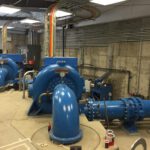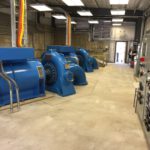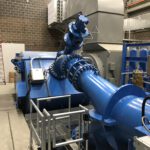Consistency and commitment are the hallmarks of long-term success in any industry, and hydropower is no exception. The long lifespan of hydropower facilities requires both producers and consumers of turbines or other hydropower components to plan for a relationship that can be measured in decades, or even centuries. Gilbert Gilkes & Gordon Ltd (Gilkes) is a hydropower manufacturing company in the United Kingdom that has prospered under that formula and continues to do so in its second century of business. Along with a perennial commitment to service and quality that allows its customers and owners all over the world to prosper, Gilkes provides turbines to the hydropower industry and pumping products to world-renowned blue-chip engine manufacturers. Darren Wager, sales director of Gilkes’ North American operations, has practiced this philosophy during his 20 years in the hydropower industry. Mr. Wager spoke with Irrigation Leader’s editor-in-chief, Kris Polly, about Gilkes’s rich history, the turbines and pumps it produces, and how its long-term vision has fostered its success and longevity
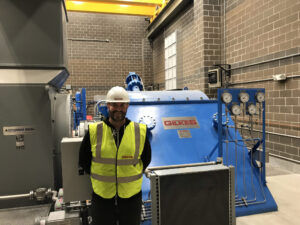 Kris Polly: What can you tell us about Gilkes’s history and products?
Kris Polly: What can you tell us about Gilkes’s history and products?
Darren Wager: Gilkes will have been in business for 165 years this year, and we have been supplying hydro turbines since 1856. We are still family owned and are likely one of the oldest hydropower companies still in existence that has not been bought out by a larger corporate entity. We have sold hydropower equipment to nearly 40 percent of the world and have turbines on all seven continents, including Antarctica.
The company started out as a farm machinery company in northwestern England and purchased the rights to a vortex turbine shortly thereafter. We soon realized we could power some of the farm machinery using the running water coming downstream from the hills, and the hydropower business grew from there.
Our current product makeup is evenly split between turbine and pump products. We also have an offshoot company focused on making investments in, and also solely developing, hydropower projects. Our products range from 50 kilowatts to 20 megawatts per single turbine unit. The designs are scalable to larger outputs if needed, but we have generally operated at or below the 20-megawatt level. Our products are focused more on medium- to high-head, as opposed to low-head, turbines. Turbines that are compatible with low head are something that we are possibly looking at developing solutions for in the future, but we do not currently have anything that can operate at those low levels.
Kris Polly: What is the oldest Gilkes turbine that is still in service?
Darren Wager: We have a turbine that is still operating that was installed in 1879 at a cotton mill that became a sawmill. The interesting aspect to this particular site is that there have been three Gilkes turbines in operation, with install dates of 1879, 1920, and 2008. That’s three Gilkes turbines installed in three different centuries, and all three are still operational today!
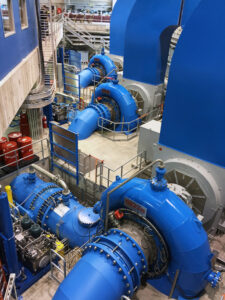 Kris Polly: Have you worked with the Bureau of Reclamation or the U.S. Army Corps of Engineers?
Kris Polly: Have you worked with the Bureau of Reclamation or the U.S. Army Corps of Engineers?
Darren Wager: We have not had direct contracts with either, but our turbines are installed at some Reclamation facilities. We recently completed the Carter Lake and Lake Granby projects for the Northern Colorado Water Conservancy District, which successfully navigated the Lease of Power Privilege Program, adding hydropower to formerly nonpowered Reclamation dams.
Kris Polly: Does Gilkes have refurbishment facilities in the United States?
Darren Wager: We do not have a dedicated American facility to refurbish our turbine equipment, but we contract that work out to specialized companies in this field when needed. In many cases, we have also sent turbine equipment and components in need of repair to our facilities in the United Kingdom and performed the refurbishment there.
Kris Polly: How can Gilkes help owners of aging hydropower plants decide whether they should refurbish or simply replace their plants?
Darren Wager: The most common tool we use to help customers with those decisions is direct communication. We typically do not refurbish turbine equipment made by other suppliers, generally focusing on equipment we manufacture. We have all the drawings and technical specifications for all our turbines, so it is easy for us to review those, examine the design, and figure out how to replicate it. We will sit down with the client, have an engineer perform an assessment, and develop a plan. The focus of such plans can include improving electrical output, increasing energy efficiency, or bringing the client’s systems up to modern standards. The biggest advancements in recent years have been in control systems, so that has been an area of emphasis for us for the past 2 decades. Increasing runner efficiencies has also been a specific focus of ours recently, and our inhouse research and development department has made some exciting improvements, with efficiency increases of 1 percent or more on our turbine runners.
Kris Polly: What should every hydropower plant owner know about Gilkes?
Darren Wager: We develop true relationships with our clients, and we are not a company that bounces from one project to the next. Our history shows the benefits of our long-term commitment to our clients and the equipment we provide them. Whenever possible, we try to align ourselves with clients who share our long-term focus. One example is the Farmers Irrigation District [in Oregon], which has made a strong commitment to longevity and growth well into the future. That commitment has led the district on a path of modernizing its water delivery systems by eliminating open canals into enclosed pipes and replacing older turbines in a way that many other districts are seeking to emulate. The district is setting itself up for prosperity and success for generations.
Quality is another hallmark of our products, and the number of turbines we have around the world that are still in operation after multiple decades speaks to the standards we build them to. That high quality translates to reliability in the product, which leads to more reliable revenue for the plant owner. We also stand behind our products long after any contractually mandated warranties expire. Those practices have allowed Gilkes to build a well-respected name in the industry, and upholding that reputation is part of the thought process we undertake with every project. Gilkes’ North American Operations Sales Director Darren Wager. I

